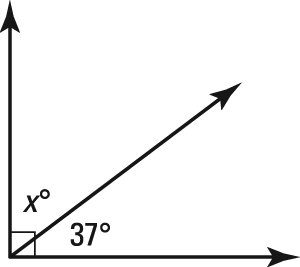What kind of angle is this? Right, Acute, Obtuse or Straight?

acute
What is 62
36
fifteen decreased by a number, x
x-15
Solve for x:
-5 = x + 9
x = -14
The sum of complementary angles & the sum of supplementary angles
90 Degrees & 180 Degress
Vertically opposite angles are always __________
Congruent/ Equal (the same)
What is 93
729
the sum of 3 times a number and 6
3x+6
Solve for x
-x - 2 = 3
x = -5
When doing multiplication and division (in order of operations), you work from ______ to ______.
left to right
Angles that are next to each other
Adjacent Angles
Which step should be performed first?
10 x 8 x 82 x 3-5
82
Simplify using the distributive property:
-8(2x-3)
-16x+24
Solve for x:
x/2 + 13 =-8
x= -42
Name the constant(s) in this expression:
14x+2y+5+9+3r
What is +5 and +9?
What is the measurement of angle x?

53 degrees?
5 x 2 + (8 - 3) + 34
96
Simplify by combining like terms:
6x-13-2x-2
4x-15
Solve for x:
-15 = -4x + 5
x = 5
What is the difference between an algebraic expression and numerical expression?
Algebraic Expressions have numbers, operations, and letters (or variables).
Numerical Expressions have only numbers and operations.
If two angles are supplementary and one measures 68 degrees, the other angle measures this
112 degrees
(4 +1)2 - 10 ÷ 5 - (5 - 3)
21
Evaluate if a=9, b=4, and c=11
6c-2a+6b
72
Solve for x:
2(x + 12) = -36
x = -30
How are inverse operations used to solve equations?
Inverse operations are used to solve equations by performing the opposite mathematical operation on both sides of the equation to isolate the variable, essentially "undoing" the operations that are currently applied to it